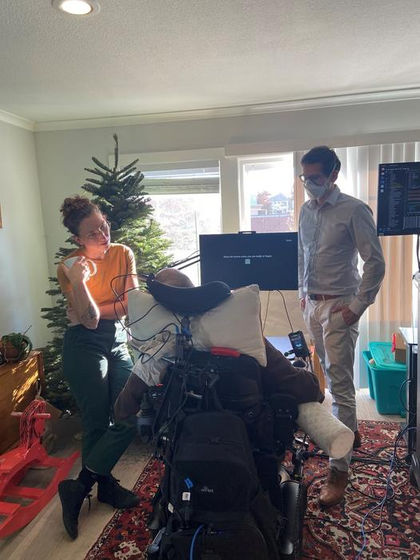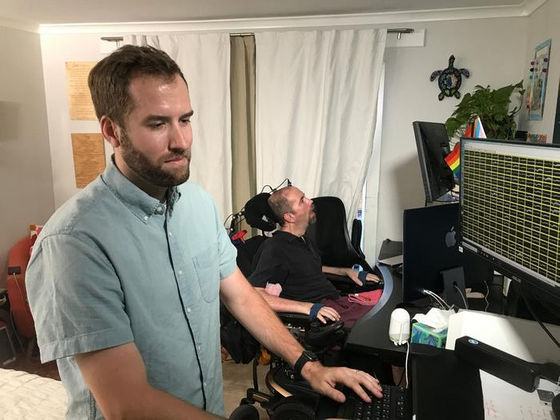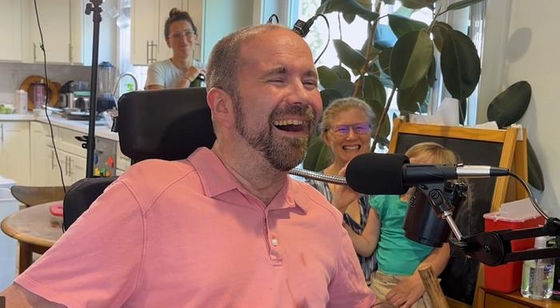A brain-computer interface has been developed that converts brain signals into speech with nearly 100% accuracy.

An Accurate and Rapidly Calibrating Speech Neuroprosthesis | New England Journal of Medicine
https://www.nejm.org/doi/full/10.1056/NEJMoa2314132
New brain-computer interface allows man with ALS to 'speak' again
https://health.ucdavis.edu/welcome/news/headlines/new-brain-computer-interface-allows-man-with-als-to-speak-again/2024/08
Brain-computer interface allows man with ALS to 'speak' again | Brown University
https://www.brown.edu/news/2024-08-14/bci-speak-again
GitHub - Neuroprosthetics-Lab/nejm-brain-to-text
https://github.com/Neuroprosthetics-Lab/nejm-brain-to-text
ALS, also known as 'Lou Gehrig's disease' after the legendary American professional baseball player Lou Gehrig , died of the disease, causes patients to gradually lose the ability to perform movements due to the loss of motor neurons that control the entire body. It can also affect the muscles used for speaking, making it difficult to speak.
Brain-computer interfaces (BCIs) are being used to restore communication skills in ALS patients, but despite recent advances in BCI technology, progress has been slow because the machine learning programs required to interpret brain signals require huge amounts of data, are slow to process, and are prone to errors.

by
'Previous voice BCI systems frequently misinterpreted words, making it difficult for them to understand what the user was saying, which created a barrier to communication,' says David Brandman, a neurosurgeon at the University of California, Davis.
Casey Harrell, a 45-year-old ALS patient, was one of those who suffered from these problems. Harrell, a quadriplegic who has difficulty using his arms and legs, and a speech disorder that makes it difficult for him to speak clearly, said he needed an interpreter to communicate.
Harrell, who participated in the BrainGate clinical trial, an effort to develop and test brain implant systems, underwent surgery to implant Brandman's research team's BCI device in July 2023. The device is designed to place four microelectrode arrays in the left precentral gyrus , an area of the brain responsible for controlling speech, and record brain activity via 256 cortical electrodes.
'The system detects when you try to speak by moving your muscles and records the part of the brain that sends commands to those muscles,' said Sergey Stavisky, co-lead researcher of the study. 'The system then translates that into patterns of brain activity and components of sound to interpret what you're trying to say.'

by
In the first data training session, the system took 30 minutes to recognize a 50-word vocabulary with 99.6% accuracy. In the second session, the vocabulary was increased to 125,000 words, but the BCI achieved 90.2% accuracy after only 1.4 hours of training. Continued data collection improved the final accuracy to 97.5%.
When Harrell tries to speak with the BCI, the system decodes the words and displays them on the screen, then reads them out loud to him. The voice he used before he developed ALS was used for the speech, so he was able to speak as before with the BCI.
'The first time he tried it, he saw the words he was trying to say appear on the screen, and he was crying tears of joy. And so were all of us,' Stavisky recalled.

by UC Regents
'Not being able to communicate can be frustrating and demotivating. It can make you feel trapped. But technology like this can help people with ALS get their lives back and reintegrate into society,' Harrell said.
Related Posts:
in Science, Posted by log1l_ks







